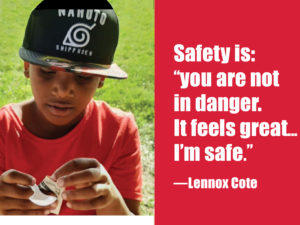Spirited Reflection: Become like children

Continuing with the KAIROS Epiphany resource, Listen to the Children: A Worship Resource for Justice Seekers (digital) (print) and Écoutez les enfants, this week we note the importance of the community in overseeing and advocating for children’s development and well-being.
In many of the gospel narratives, we celebrate the birth of Jesus, then fast-forward to the final few years of his ministry, and finally honour his death and resurrection. Few gospel stories look into Jesus’ years as a young person. Luke 2:22-40 (and beyond) gives rare insight into Jesus’ childhood and upbringing.
Jesus is still a weeks-old baby at this point. He is central in this story but does not say or do anything on his own. Instead, the newborn receives blessings and is responsive to the actions of the adults around him.
The story begins with Jesus’ parents, Mary and Joseph, travelling back to their home community in order to present their infant before God, in the presence of those in the temple. Having young Jesus presented in the temple was a custom or tradition that harkens back to the Law of Moses.
Simeon and Anna are two other adults present in the temple that day. Both are much older and are devout Jews who also follow the faith tradition. They meet the child in the temple and praise God. Simeon, guided by God’s Spirit, blesses the child and speaks about what he is destined for. Anna, a prophet, speaks to the child about redemption.
We too may present our young children before God and the faith community for baptism, christening or child dedication. It is a time when parents commit to raising the child in God’s love. And it is about more than just the parents and the child. Godparents and others may speak for the child in a public ceremony, in essence advocating on their behalf. In fellowship, the broader community too commits to supporting the child in the family of God – to love, guide and protect the child.
Knowing that Mary and Joseph followed these traditions is a reminder of how faith traditions bring us together and support us in following God’s way. Simeon and Anna demonstrate a willingness to think beyond their own immediate circles. They each speak out, bless and encourage a family we can assume they have never met before. Let us not limit our good intentions to the children in our own churches. Like Simeon and Anna, may we remember the promises we make as a community when each child is baptised and take those promises into the world.
So… there are many ways responsible adults can be part of the upbringing and well-being of children.
- Adults can play the important role of advocates and allies for children in general. One contemporary example is Cindy Blackstock. A member of the Gitxsan First Nation and an award-winning professor from British Columbia, she is a tireless advocate for the rights and equality of Indigenous children.
- Similarly, Sara Austin, Founder and CEO of Children First Canada, has advocated for changes to international laws regarding child protections.
We ask—how might all adults become advocates for children?
Finally, in the biblical passage, Simeon speaks about what Jesus is destined for. He offers a positive vision of Jesus’ future.
We ask—what is your vision for the children around you or the children whose stories you know? How might we encourage all children to reach their full potential? What can we learn from Luke’s story of the infant Jesus about how to live our lives today?
In considering what adults, community and a whole culture can and should do for a child (honour, protect, and raise in safety and generosity), the following words come from two children— both from Canada:
Lennox Cote is “eight years old, almost nine” and takes a broad perspective, telling us, “I live in Ottawa, Canada, planet earth, universe, Milky Way.” For Lennox, safety means: “If you are hiding or safe or you feel safe because people are guarding you or helping you.” He credits his Mom, “She helps me a lot and I’m safe. It feels great.”
Lennox tells us how this can spread, “you know how you can just make a difference about one thing and then it goes on to another person and another person and it keeps going. That’s how you feel safe, because you do one thing and then it keeps going and going.”
Marie-Katherine McLaughlin is 10 and tells us, “I’m in grade 5 in Amherst, NS.” From her perspective there is peace when “everyone lives in harmony and there is no fighting,” freedom when “no one is a slave, and everyone can go to school,” and safety when “no one is roaming the streets. It means I have a family to take care of me.”
Marie-Katherine is ready to take responsibility. She says for people to know peace, freedom and safety, “I need to be kind to others and protect others.”
With thanks to the KAIROS Epiphany Team, including all the child/youth consultants and Shannon Neufeldt, to Adele Halliday – team leader for Discipleship and Witness at the United Church General Council Office, on maternity leave – for this reflection and to Lennox Cote and Marie-Katherine McLaughlin for their comments.








